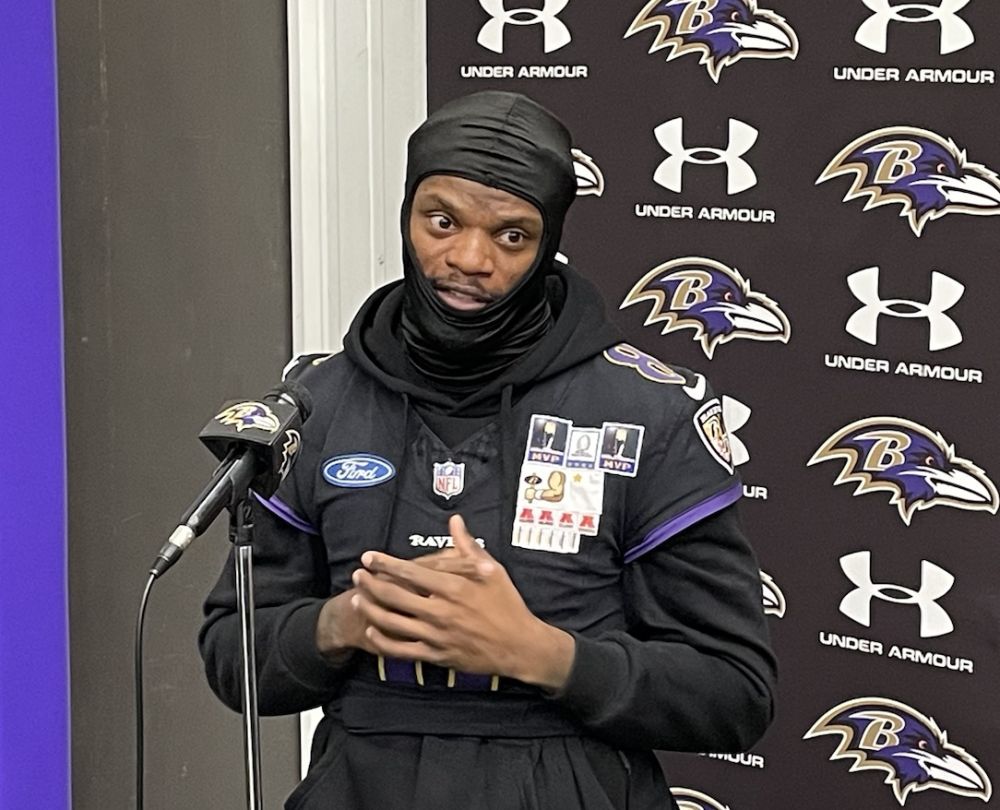Moral victories are overrated.
The Ravens still lost to Pittsburgh on Wednesday to be eliminated from AFC North contention, ending their two-year reign as division champions. At 6-5 and having lost three in a row and four of the last five since the bye week, Baltimore has very little margin for error to qualify for the postseason. An undermanned team falling 19-14 to the undefeated Steelers shouldn’t bring satisfaction or any assumption of a return to 2019-like form when acknowledging the problems that existed before Week 12.
But this wasn’t the usual “uplifting” loss from an underdog — not when you’re missing upwards of 15 notable players because of a virus that swept through your building. That kind of adversity goes far beyond on-field shortcomings or some questionable play-calling when you’re talking about the physical health of human beings in the midst of a pandemic.
Head coach John Harbaugh acknowledged the organization “didn’t bat 1.000” handling the outbreak that sent 24 players to the reserve-COVID-19 list over a 13-day period and reportedly started with strength and conditioning coach Steve Saunders violating protocols, problems that still warrant explanations. If the NFL truly cared about the health and safety of its players after the original Thanksgiving date was postponed three different times, the game would have been moved to the end of the season. Players still eligible to play in Wednesday’s game lost much of their meaningful ability to even stay ready physically, let alone to prepare to compete in an NFL game when the Owings Mills facility was closed for the better part of a week.
Such an event tests the trust between an organization and its players to an extreme degree.
After the game, quarterback Robert Griffin III noted that family members of infected players have also tested positive and admitted concern “about whether or not our safety is actually being taken into account.” Safety Chuck Clark still wondered why the team facility was reopened last Monday and Tuesday if contact tracing was effectively being done when running backs J.K. Dobbins and Mark Ingram learned they tested positive for the coronavirus on the night of the Tennessee loss on Nov. 22.
Yes, the undermanned Ravens easily could have gone through the motions against a superior team on Wednesday after players expressed legitimate concerns about the game being played at all. And you’d have barely blamed them if looking past the helmets and shoulder pads and recognizing their humanity.
But the Ravens competed hard in the wake of a widespread outbreak and after some had questioned their effort and toughness late in the Week 11 loss to the Titans. The fact that players didn’t “go into business for themselves” after any perceived violations of trust from the league or the Ravens organization should offer optimism from a football standpoint the rest of the way.
“This team is fighters. They came in, they came into the fight, [and] they were ready to roll,” said left guard Bradley Bozeman, the lone member of the Week 1 offensive line still playing his original position. “We’re going to get a lot of guys healthy back. We’re going to just build from here. This is just the beginning.”
Of course, that starts with the return of star quarterback and reigning NFL MVP Lamar Jackson, who has remained “in good spirits” in Marquise Brown’s words after testing positive for COVID-19 on Thanksgiving. Jackson broke his silence on social media during Wednesday’s game and will be eligible to return in time to play in Tuesday’s home meeting with Dallas if he’s deemed ready to go physically, something that shouldn’t be automatically assumed for any infected player.
As was the case before the outbreak, the question is whether the Ravens offense can discover more productivity despite not having the likes of All-Pro left tackle Ronnie Stanley and top blocking tight end Nick Boyle for the rest of the season. Whether pointing to Jackson, a reshaped offensive line, or the team’s pass-catchers, the Ravens aren’t going anywhere — even if they make the playoffs — without more productivity in the passing game. There wasn’t much to gauge from Wednesday’s loss in that department beyond some hope that Brown’s 70-yard touchdown sparks a late-season rebound for the 2019 first-round pick, but the anemic passing output highlighted how little the attack has going for it beyond Jackson, Pro Bowl tight end Mark Andrews, and slot receiver Willie Snead, who all missed the game.
The most uplifting football takeaway from Wednesday’s loss was the performance of a defense without key members of its front such as Calais Campbell, Brandon Williams, Matthew Judon, and Pernell McPhee. After playing some of their worst defensive football of the season in the fourth quarter and overtime against the Titans, the Ravens defense allowed just one touchdown in Pittsburgh’s four goal-to-go opportunities, keeping the game close despite the Baltimore offense having seven instances of either going three-and-out or committing a turnover.
As it has for most of the year, the Ravens defense should continue leading the way while the offense tries to get its best players back and regroup.
“We’re going to be solid. We’re just going to win games from here on out,” said Clark, who led the Ravens with 13 tackles on Wednesday. “That’s all it takes. We know what our goal is, and that’s the ultimate of being a champion and winning a championship.”
Even with how brutal November was, qualifying for the playoffs still sits right there for the Ravens despite their present standing outside the AFC field. Their final five opponents own a combined 18-36-1 record, giving them arguably the easiest remaining schedule in the league. They should be a heavy favorite in all but one of their remaining games, a Monday night trip to 8-3 Cleveland on Dec. 14. And the allure of home-field advantage is all but gone in this bizarre 2020 season anyway, easing any disappointment of only being able to aim for a wild-card spot now.
For what it’s worth, football analytics sites remain high on the Ravens’ chances of making the playoffs.
Get healthy and get in the tournament, which is exactly what the 2012 Ravens were able to do after their own three-game losing streak in December that threatened to derail their season. Harbaugh figures to share that message with his current players, who showed they’re still listening and fighting for him and the rest of the organization with a commendable effort in Pittsburgh to conclude one of the most challenging weeks in franchise history.
“Whatever happened, they didn’t blink,” Harbaugh said. “That was our goal, not to blink, because we’re not going to be pushed around by something that we can’t control. We controlled the things we could control in that sense, and that’s the real test. I think that’s the type of adversity that great things are built on.”
We’ll see how much building the Ravens can manage the rest of the way.






















